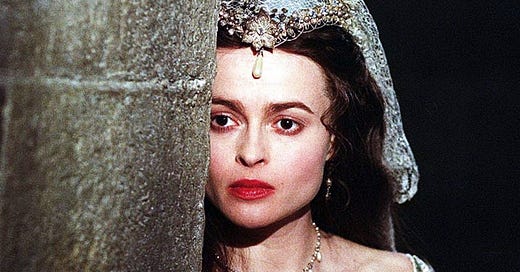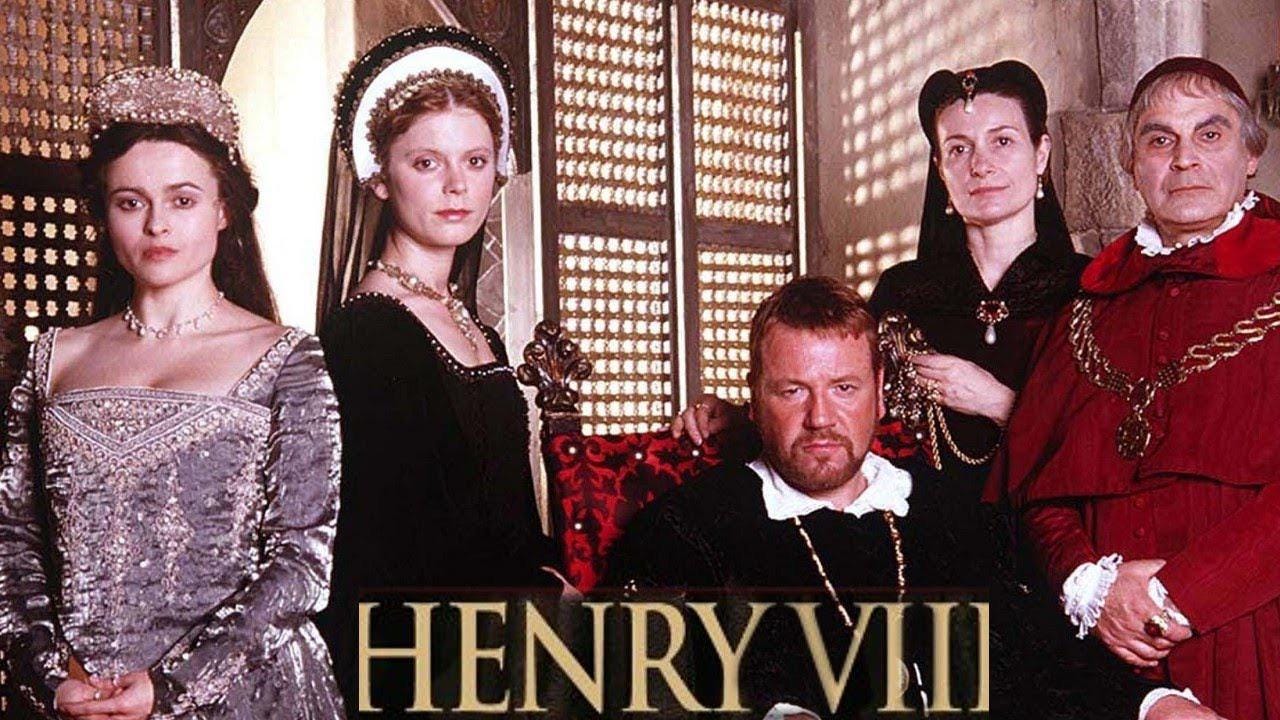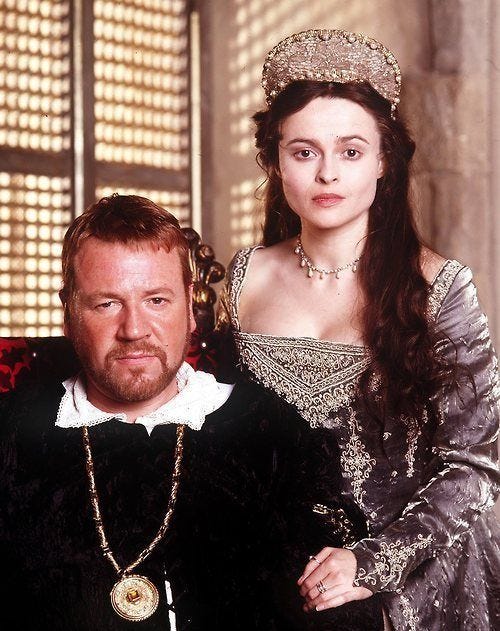Stimulating history or destructive entertainment? - The Portrayal of Henry VIII & Anne Boleyn's Relationship in the TV Film 'Henry VIII' (2003)
The problems surrounding fictionalised portrayals of sexual assault in historical drama.
“Plenty of historians will find what we have done scandalous. But I’m aiming to stimulate greater interest in history, rather than to score points with a particular version of events.” - Peter Morgan, writer of ‘Henry VIII’ (2003).
Well, kudos to Peter Morgan - his TV film adaptation of Henry VIII’s reign, starring Ray Winstone as the big man himself, certainly stimulated a greater interest in history for me. I was way too young when I first watched this sometimes dark; often gory; unquestionably grown-up Tudor drama, which was described by its director as ‘The Godfather’ in tights. I remember being equally horrified and fascinated by this cockney-sounding, emotionally temperamental Henry VIII, whose brutal execution of his enemies always had me running out of the room in fright! (Now the execution scenes no longer see me running out of the room, but I do have an unfortunate compulsion to laugh whenever I hear Winstone’s rasping of “Annnnne”)!
The broadcast of ‘Henry VIII’ in 2003, coincided with my first introduction to those terrible Tudors in primary school. I was equally fascinated and horrified by this fat old king, who dared to cut off the heads of two of his wives! So dramatic was this Tudor tale, that I often thought my teacher had confused history lessons with fantastical fiction - and Peter Morgan’s ‘Henry VIII’ just encouraged this belief. The combination of academia and popular culture in this instance definitely fostered my love for the 16th century; a love which would only deepen as I grew older.
So I suppose I have to thank Peter Morgan for when it comes to my obsession with the past. However, watching the film now reveals many disconcerting elements. These elements undoubtedly boost the film’s entertainment value. Yet in the wake of my research into history, feminism, and popular culture, I can see now that ‘Henry VIII’ is littered with stereotypical, misleading, and outright disrespectful themes.
In 2003, the journalist Mark Lawson said that ‘[t]rue to modern sexual politics, Morgan is hard on Henry’ yet ‘soft’ on his wives, especially Katherine of Aragon and Anne Boleyn. In Lawson’s eyes, the women were allowed to give valiant defences of their integrity, whilst Henry was shown to be unfaithful, aggressive, and unpredictable.
Whilst Lawson’s conclusion isn’t entirely incorrect, I find myself largely disagreeing with his statement. Despite being physically and verbally violent to many of his queens, (which I might add, went against current feminist attacks against rape culture and violence against women), audiences were encouraged to sympathise with Henry instead. Not only that, but many of the exaggerated and fictionalised segments in ‘Henry VIII’ did a huge disservice, not just to the memory of the wives, but to Henry as well.
Let’s focus today’s article on the representation of Anne Boleyn, who was played by the magnificent Helena Bonham Carter. Helena’s Anne was feisty, headstrong, ambitious, physically and intellectually alluring, yet immensely aware of her vulnerability. This portrayal of Henry VIII’s second queen certainly fitted the early 21st century ideal of a strong feminist icon, whose flaws also made her relatable to a modern audience.
Sounds great right?!
Sadly, all the feminine empowerment which was embodied in Anne Boleyn’s character was hugely undermined by a fictionalised rape scene. In this horrendous scene, Anne argues with Henry, who becomes so enraged that his physically assaults Anne in order to dominate and subdue her.
This interaction was not only fictionalised - it was unnecessary and poorly done. In the immediate aftermath of this scene, viewers witness Henry’s distress, not Anne’s. Are viewers meant to sympathise with Henry? It surely looks that way. By cutting to Henry’s anguish and focusing on his feelings, Anne’s experiences are excluded. Moreover, it looks as if Henry was pushed to act in the face of Anne’s ‘unreasonable’ behaviour. By being ‘difficult’ - (read ‘standing up for her beliefs’ and ‘voicing her opinions’) - Anne almost asked for it.
This theme was echoed later in the film, when Henry physically assaulted his third wife Jane Seymour during an argument, which resulted in Jane’s premature labour and belittled her moment of agency. Again, this implied that Jane’s impassioned behaviour pushed Henry towards violence. Rather than igniting disdain towards the King, viewers are once more faced with Henry’s grief and devastation upon Jane’s passing; sparking compassion for his plight. What’s more, Jane’s story arc carefully implied that if she had only kept her mouth shut, then both Jane and Henry could have lived happily ever after with their son. Or, the storyline wrongfully blames Henry for his wife’s death. Either way, it is hugely disrespectful to both parties.
With Henry’s attack on Anne Boleyn being completely fictitious, the scene echoed the outraged response to the rape scene in Reign, which saw viewers lamenting the fact that once again, a strong heroine was unnecessarily compromised by sexual violence and male intimidation, without any benefit to the character’s real life experiences - nor to the benefit of the drama itself!
As mentioned earlier, the rape scene between Henry and Anne went against contemporary feminist rhetoric, which fought for greater awareness surrounding sexual violence towards women, as well as enhanced protection for women and the annihilation of rape culture within society. Thus the ‘sensationalism’ of Henry and Anne’s relationship in ‘Henry VIII’ ignited outrage amongst viewers and historians alike, both for its injustice and its inaccuracy. The historian Derek Wilson condemned the scene for going ‘against everything we know about their relationship and the character of Henry’, before criticising the writers for embellishing the just-as-gripping historical truth. The scholar Christopher Haigh agreed, and highlighted the damage which the scene could inflict upon Henry’s reputation: ‘I know he [Henry] treated some of his wives very badly, but he still obeyed the old-fashioned courtly conduct expected of men in those times. To include something like this in the programme is a bit over the top.’
The director of Mediawatch UK, John Beyer, criticised the scene for a different reason. Besides ruining Henry’s reputation with false depictions of his character, Beyer focused on the modern implications. ‘Television makers do this sort of thing all the time. They write in particular scenes, sex it all up - and it adds to the idea that this is an acceptable activity, which it isn’t. I am sure they include things like this to attract more viewers and improve the ratings, and including the rape scene in Henry VIII is just another example of this’. Yes, the scene did add entertainment value in a bid to attract more viewers… but is it morally right when ‘entertainment’ encourages viewers to sympathise with the perpetrator, and subtly blames the victim? Is it justifiable to present this unforgivable crime as entertainment in the first place, especially in a historical drama where the event itself is unsupported by historical fact?
Nope. Absolutely not.
Sure enough, when confronted with the allegations, the writer Peter Morgan justified the scene by claiming that he wanted to stimulate a ‘greater interest in history’. Unfazed by the criticisms, Morgan would go on to include another fictionalised rape scene between Henry and Anne in the 2008 film The Other Boleyn Girl, in another attempt to titillate and scandalise audiences. Furthermore, a Granada spokesperson argued that the deterioration of Henry and Anne’s relationship was a historical fact, ‘the result of which could have feasibly been rape’.
I think we can all agree that these ‘justifications’ by Morgan and Granada don’t quite cut it, and we stand by Dr Owen Emmerson when he says he is disappointed by Morgan’s arguments. It shamed Anne, defiled Henry’s reputation; it sensationalised a traumatic reality for many women, and encouraged sympathy towards destructive behaviours which many feminists were striving to eliminate.
There is so much that I could say about this film - (don’t get me started on the representation of Kathryn Howard!), - but I won’t keep you all, as I’ve already whittled on for long enough. However, I must end by saying that I will always maintain a soft spot for 2003’s ‘Henry VIII’, as it played a huge role in fostering my admiration for the Tudor characters it portrayed. And this article is not a criticism against the use of artistic licence in historical dramas. Rather, it is a reminder that history in popular culture possesses huge responsibility - not solely towards the memories of those it depicts, but also upon those who view them in the modern age.








Leigh- I haven’t seen 2003’s Henry VIII, so this article is really inspiring me to do so. Especially with the nuanced depiction you’ve shared. Thank you!